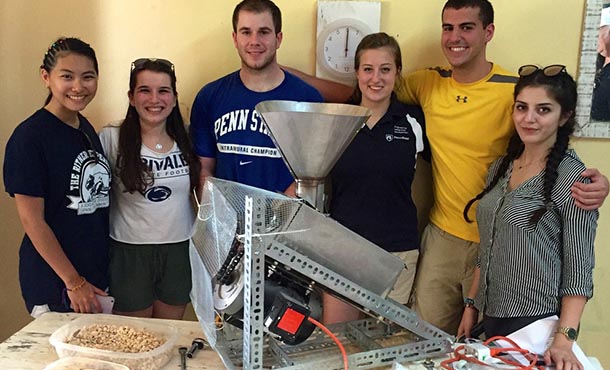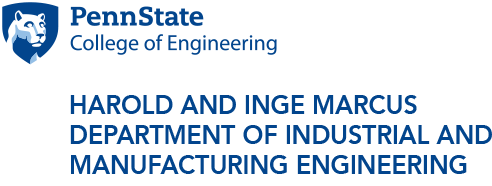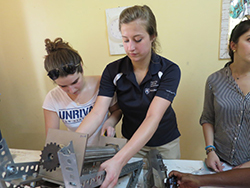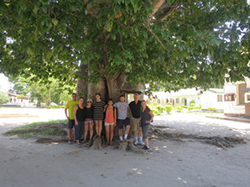
Students stand with the baobab processing machine. From left to right: Elsa Ng, Kelly Hensler, Matt Krotowski, Heather Svec, Adam Merendino and Nadine Geagea. Image: Heather Svec
Engineering students help communities in Africa, learn leadership skills
4/1/2016
UNIVERSITY PARK, Pa. — The baobab tree, commonly called the tree of life, is a staple in many rural African communities. Every component of the tree is beneficial in some way – providing sustenance and income to the people in these communities. However, the tree’s fruit, made up of seeds, pulp and fiber, is difficult to process. The current method of using a mortar and pestle is very difficult and inefficient.
For the last five years, Penn State students in the Engineering Leadership Development (ELD) minor have worked to alleviate this by designing and building a baobab-processing machine as their minor capstone project.
Each semester, students in ENGR 496 redesign the previous semester’s machine to make improvements and meet the needs of the African locals. The students build the machines over the course of a semester in the College of Engineering’s Learning Factory. Once the machines are complete, the students and faculty members travel to Africa to deliver the machines and teach the locals how to operate them.
Heather Svec, a senior in mechanical engineering, traveled to Tanzania with five other students and two faculty members to deliver this semester’s baobab-processing machines. Svec, who also took the course last semester when the group traveled to Benin, Africa, was familiar with the previous machine and was able to take a leadership role in improving it this semester.
Providing women engineers like Svec with opportunities to serve as leaders is something Meg Handley, associate director of engineering leadership outreach, is honored to play a role in.
“I’m proud to be a part of a program that enhances, encourages and builds up women as engineering leaders,” Handley said.
Svec, along with Matt Krotowski, mechanical engineering; Adam Merendino, chemical engineering; Elsa Ng, petroleum engineering; and Nadine Geagea and Kelly Hensler, industrial engineering, traveled to Dar es Salaam, Tanzania in March to meet with locals and walk them through the assembly and use of the machines. Mike Erdman, the Walter L. Robb Director of Engineering Leadership Development, and Handley accompanied the students.
The students’ design continued the previous themes of simplicity and ruggedness, while increasing strength and functionality of the machine. An updated pulp processor includes a stainless steel perforated plate supported by stainless hose clamps that increases the strength of the heart mesh. Future improvements are envisioned, such as replacing the mesh support rings at the end of the plates by waterjet-cut stainless rings.
Erdman said understanding the need for a simple machine that meets the needs of the locals is an important part of empathetic engineering – a fundamental component of being an engineering leader.
“You need to understand what the users really need and will benefit from, and try to find a way to get that to them,” Erdman said. “Empathy is a critical part of being a good leader. You need to be able to not only observe, but put yourself in their position.”
Part of empathetic engineering involves being able to step into the shoes of the user. ELD minor students not only needed to explain the process of the machine, but show the correct way to use it – all from the perspective of a first-time user.
“We demonstrated exactly how the machines should work and explained different things they could do to fix some common problems that might come up through normal wear and tear,” Svec said.
During assembly, the students had to think on their feet after realizing the machines had been somewhat damaged during shipping.
“When we opened the boxes our machines shipped in, we immediately noticed that many of the parts ended up getting bent and distorted on the way to Africa,” Hensler said. “Because we were building the machine in front of our customers, we couldn’t let this discourage us.”
The students worked together to troubleshoot the issues with the limited tools and resources they had access to.
“They all relied on each other, seamlessly working as a team, to put the machine together,” Handley said.
Hensler agreed, saying that the team’s ability to maintain a positive attitude while trying to problem solve is an important leadership attribute engineers need to demonstrate to customers.
“Our optimism helped the locals trust us and trust that the machine would work and be useful for them,” she said. “As an engineering leader, it is important to stay positive and be able to quickly adapt to change.”
The main goal of the machines is to separate the baobab seeds and pulp so both can be used for different products. The pulp has an extraordinary amount of nutritional value and can be used for food and medicinal purposes. The seeds are used in the food and cosmetics industries.
The locals were impressed that the student-built machines were able to thoroughly clean the seeds, even removing pulp material that isn’t completely dry – something that isn’t possible with the traditional processing method. Erdman said it is imperative that engineers have the opportunity to experience the reactions, questions and comments of the local people first-hand, in order to better meet their needs.
“Attending trips like this opens your eyes to the world and breaks barriers,” Erdman said. “The way people talk to each other, their expectations, their understanding of what you’re saying is completely different and varies depending on which countries you are going to. It’s important for our engineers to understand the difficulties people in other countries face as they try to find their way in the professional environment.”
During the trip students also experienced the history, culture and environment in Tanzania through a presentation on the slave trade, an ancient graveyard tour and a safari.
Combining technical skills with global leadership skills and cultural understanding is necessary for engineers to continue the betterment of mankind through design and innovation. The experience of traveling to Africa to personally deliver and train the local people is something that resonates with engineering students.
“Immerse yourself in a culture and try to take their viewpoint whenever you are working internationally,” Svec said. “This project really motivated me to continue my passion to help make people’s lives easier.”
The Engineering Leadership Development (ELD) minor is offered through the ELD program in the School of Engineering Design, Technology, and Professional Programs (SEDTAPP). ELD is sponsored by General Motors, Automation Direct, Bechtel Power Corporation, Lockheed Martin, Alcoa, ArcelorMittal, Textron, John Deere, GE, Rockwell Automation, Merck and GKN PLC.





